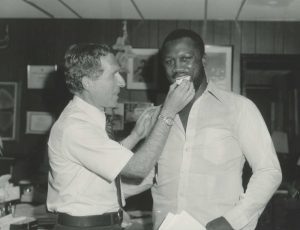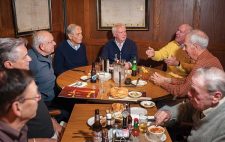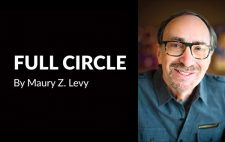

You are working to get a historical designation for Navy Chaplain Howell Forgy of Haddonfield. Who was he?
He was chaplain on USS New Orleans during WWII. Prior to the war, he was a pacifist. As soon as the United States became involved in the war, he enlisted. According to his mother, when the threat came close to our own shores, he joined the Navy because he wanted to be in the thick of things. The sailors were hoisting 5-inch shells weighing close to 100 pounds by hand from the bottom of the ship to the top where the heavy guns were. The sailors struggled, exhausted, as smoke choked them and got in their eyes, and a tremendous noise of exploding shells further troubled them. As chaplain, Forgy could not shoot a gun or handle shells, but he could offer words of encouragement. He walked up and down theline of sailors patting them on the back shouting, “Praise the Lord and pass the ammunition,” which later became a popular WWII song.
Why is acknowledging him important?
Chaplain Forgy lived in historic Haddonfield at 215 Westmont Avenue. I would like to get the Borough of Haddonfield to put a bronze plaque on the sidewalk in front of the home. He was considered a hero in the Second World War. His son said he buried 2,200 men during the war, which was more than any other chaplain who served in the Pacific during the time. It’s important to me because my home in Cherry Hill is 10 minutes by car from where Chaplain Forgy lived. I consider him a neighbor. The phrase “Praise the Lord and pass the ammunition” is quoted in many of the standard quotation books, including the Oxford Dictionary of Quotations.
How is the effort going?
It is not going well. The people in Haddonfield and neighboring towns do not know who Chaplain Forgy is.
Why was WWII a prolific time for music?
Some of the most memorable and enduring music of the 20th century was written during the Second World War. With patriotism at an all-time high, the war effort became an integral part of the entertainment industry, creating an emotional wartime dream world of heroes, love, remembrance, reflection and introspection.
Why did you want to chronicle this history?
I wanted to explain the stories behind the songs. Of these tens of thousands of songs that were written, only a handful identified specific events, happenings, occurrences and/or individuals that have been the subjects of popular songs. In my book, I pick out the most notable of those songs.
You were just 9 years old then. Why did the music of that time resonate with you so strongly?
I’ve always been interested in music. In school we had to memorize these songs and sing them. They stayed with me – I could probably recite the lyrics and choruses now. I always played piano in a band, starting from when I was in junior high school and all the way through college. We played in the Catskill Mountains in New York and the Orange Mountains in New Jersey. My mother was a tremendous pianist and my first piano teacher. I really loved those songs, so I started doing research on them.
Can you share a story about a WWII song?
“Johnny Zero” was a popular song then. John Foley was a soldier who wasn’t too smart. The song made the point that while in school he got zeros, which isn’t good, but during the war he shot down Japanese Zero planes, which is good. He was a typist who wanted to be transferred to a combat unit, but they wouldn’t transfer him because he wasn’t smart. So they sent him overseas to Guinea and put him in a typing pool. He was smart enough as a clerk typist to type up orders to transfer himself into a combat unit, and he became a gunner on a plane. Between the South Pacific and Europe he flew 60 missions and was shot down three times and claims he walked away without a scratch. The song was recorded by numerous artists, including Eddie Cantor.
The book also talks about WWII songs in movies. Can you share an interesting story about that?
The song “The Last Time I Saw Paris,” written by Jerome Kern and Oscar Hammerstein, was very popular. It won the Academy Award for the best original movie song in 1941. It was sung by Ann Sothern in the movie “Lady Be Good.” But the problem was that the song wasn’t written for that film, it was put into that film in the hopes of getting more people to buy tickets to see the movie. Kern and Hammerstein didn’t want to accept the award, but the Academy of Motion Picture Arts and Sciences insisted they take the award. From that point on, before a song could be considered for an Academy Award, it had to be written specifically for a particular movie.


He had a gym on North Broad Street, which was near the dental school. In 1979, one of the students used to hang out outside the gym, because he wanted to meet Joe Frazier. He got to him one day and said he was a dental student and invited Frazier to come over to school so he could make a mouth guard for him. Of course, he wasn’t qualified, but he did bring over Joe Frazier. I said I’d make the mouth guard, and then Joe sent down all the rest of the famous boxers from Philadelphia. I got to know them all and made them all mouth guards. Joe became a very close friend of mine. He used to walk over to my office, which was down the street from his gym, and tell me his life story, time and time again.
Tell us about the origin of “God Bless America.”
Kate Smith and her manager, Ted Collins, asked Irving Berlin for a song that Kate could sing over her CBS coast-to-coast radio program. They wanted a song that would unite the country. Irving thought back to a song he had written during the First World War for a show called “Yip! Yip! Yaphank!” The song “God Bless America” was originally written for that show, but it was never used. Irving pulled the song out of his files and gave it to Kate Smith. She introduced the song on Armistice Day in 1938 on her radio show. The song was an immediate hit. Everybody loved it and people petitioned Congress to change the national anthem from “The Star-Spangled Banner” to “God Bless America.” The three people against even considering the change were Kate Smith, Ted Collins and Irving Berlin. They argued that “The Star-Spangled Banner” was a wartime song written during the Battle of 1812, while “God Bless America” was a peace song, written long before the United States entered the Second World War.









